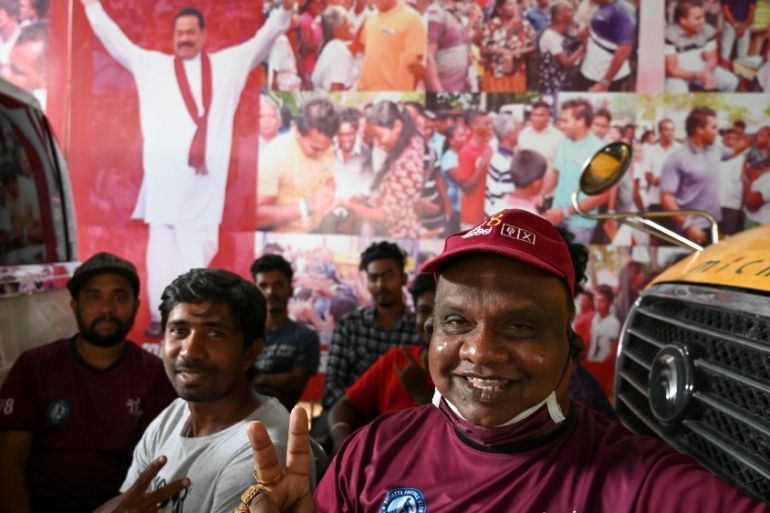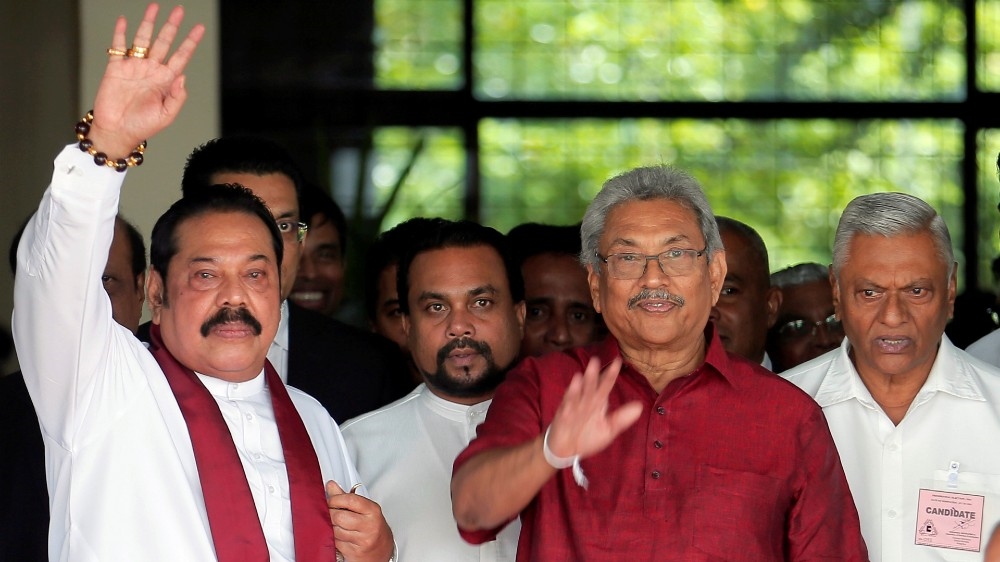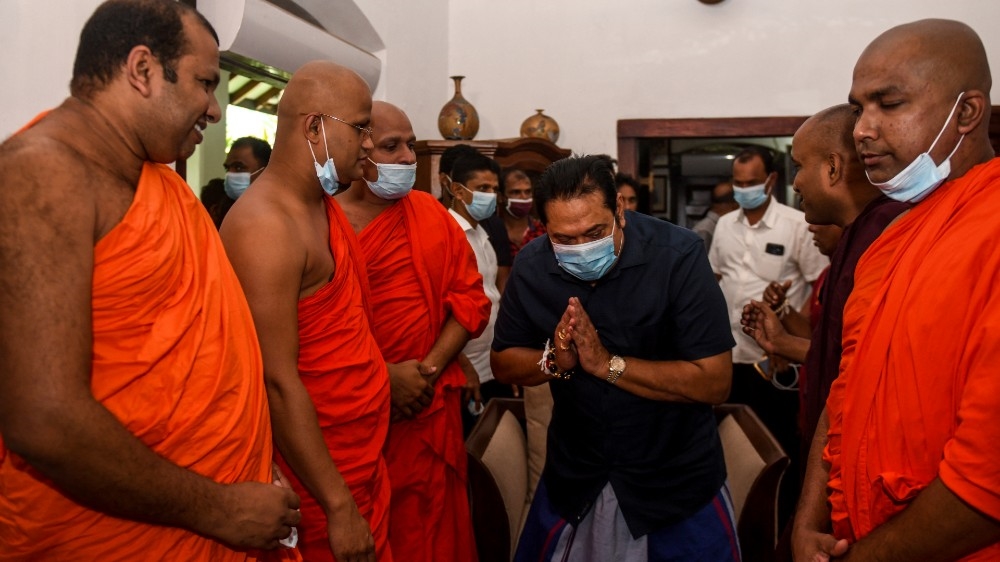Sri Lankan parliamentary elections: Five key takeaways
President Gotabaya Rajapaksa and his brother register huge victory. So, what does this election result mean?

President Gotabaya Rajapaksa and his brother, former two-term President Mahinda Rajapaksa, are celebrating a landslide win in Sri Lanka’s parliamentary election, according to results released by the country’s election commission.
The brothers’ Sri Lanka People’s Freedom Alliance (SLPFA), of which their Sri Lanka Podujana Peramuna (SLPP) is a majority stakeholder, stormed to victory in districts across the island of 22 million people, winning at least 150 seats, out of a total of 225 in the unicameral legislature.
Gotabaya Rajapaksa, the younger of the two brothers, was elected as president in a similar landslide victory in November, campaigning on a platform aimed at stoking ethnic Sinhala nationalism, promising strong security policies and centralised leadership.
Mahinda, the elder brother, is expected to be elected prime minister when Parliament convenes following the election.
So, what does this election result mean?
The Rajapaksa family strengthens its grip on power, with constitutional amendments in the offing
While an SLPP win was largely expected, there was some uncertainty over whether they would be able to achieve the two-thirds majority required to amend the constitution right off the bat, or if they would need to make deals with other parties while forming a coalition.

Wednesday’s resounding victory means the SLPP no longer needs to enter into compromises with other parties. It has the numbers to deliver sweeping constitutional changes to increase the executive authority of the presidency, as promised by the Rajapaksas in both this and the earlier presidential election.
Possible removal of a two-term limit on the presidency, which would allow Mahinda to run in the next election four years from now, is also under consideration.
Their focus, however, will be on the 19th amendment to the constitution, passed in 2015 after Mahinda was voted out of office following nearly 10 years in power. That amendment vastly reduces the executive powers of the president, distributing them more evenly between the prime minister, Parliament and other democratic institutions.
The Rajapaksas contend the weakening of the presidency led to inefficient governance and weak security policies.
Gotabaya, who was defence minister during his brother’s presidency, and Mahinda are credited with bringing an end to the more than 30-year civil war with armed Tamil separatist rebels in the north and east of the country.
The end of the war saw a series of brutal battles, with rights groups alleging widespread killings of civilians. Gotabaya has long been accused of possible war-crimes during that period.
Continuing centralisation of power, rights groups warn of rising authoritarianism
Since Gotabaya assumed office in November, political analysts have noted a rising centralisation of power, with the younger Rajapaksa appointing many serving and former military officials to key bureaucratic posts, and creating presidential task forces to take on governance issues, in some cases bypassing ministries.

In March, President Gotabaya dissolved Parliament, on the earliest date allowable by law, calling elections in April. Due to health concerns around the coronavirus pandemic, however, the election commission said holding a poll at that time would be impossible, leading to a constitutional crisis wherein there was no parliamentary oversight over presidential power for a potentially indefinite period.
In May, the country’s Supreme Court ruled in favour of the president in a case lodged by activists and the political opposition, allowing Gotabaya to continue to rule directly until the August 5 poll, well past the constitutionally prescribed three months he would normally be allowed to do so.
Gotabaya‘s rule has been marked, rights groups say, with a widespread crackdown on political and other dissent, with lawyers, activists and journalists harassed, intimidated and arrested when they have questioned the government’s policies.
“The relative freedom and civic space that was enjoyed in the past few years was increasingly at risk under the new government,” said Thyagi Ruwanpathirana, South Asia researcher for Amnesty International. “Critics and dissidents ranging from civil society activists, social media commentators, lawyers and journalists were all at risk for being outspoken against government decisions.”
Potential flashpoints of tension with minority communities
In November, Gotabaya ran on a platform explicitly aimed at the island’s 70 percent ethnic Sinhalese majority, most of whom are Buddhist. His campaign was based on promising strong security policies, and it empowered several hardline Buddhist monks who had often made statements targeting the country’s Muslim minority.
The SLPP’s parliamentary election campaign promised much of the same, and came on the back of a controversial decision by the government in April to mandate the forced cremation of all COVID-19 patients who died of the coronavirus.

That decision, avowedly made on health grounds, was decried by rights groups and the island’s two million-strong Muslim community as being aimed at denying them burial rights, as required under Islam. The World Health Organization has said burying those who die of the virus did not increase the likelihood of infection.
Through this election, the SLPP and its allies have frequently used much of the same rhetoric, with the island’s Centre for Monitoring Election Violence (CMEV) noting several significant instances of “hate speech” at SLPP and SLPFA campaign events.
Tamil citizens, who form more than 10 percent of the population, meanwhile, continue to feel at risk following the Rajapaksas’ pardoning of many military officers being investigated for alleged war crimes during the end of the civil war.
Fractured, and decimated at the polls, what next for Sri Lanka’s opposition?
The United National Party (UNP), led by former Prime Minister Ranil Wickremesinghe, entered the polls on the back of years of misgovernance and, more recently, infighting that saw it split into two separate parties ahead of the polls.
In February, the UNP’s presidential candidate in the November presidential election, Sajith Premadasa, formed the Samagi Jana Balawegaya, breaking away from the UNP and taking the majority of the party’s members of Parliament with him.

Both parties, however, fared poorly at Wednesday’s poll, with the SJB coming in second with 54 seats, and the UNP winning just one seat, according to preliminary results.
The UNP has long seen a tug of war between Premadasa, the son of former President Ranasinghe Premadasa, and Wickremesinghe, the party’s long-standing leader.
The party, analysts say, is now at a crossroads, following two crushing electoral defeats.
“Will Ranil Wickremesinghe eventually fade away, or will Sajith prove not to have what it takes?” says Alan Keenan, a senior consultant on Sri Lanka for the International Crisis Group. “Or maybe Ranil is finally displaced or forced to retire – although he does seem indefatigable.”
An economic crisis on the horizon
Whatever the political landscape looks like, the Rajapaksas’ immediate concern will be the island nation’s economy, struggling under the burden of low tourism numbers, coronavirus pandemic induced economic inactivity and crushing foreign debt.
This year, the World Bank estimates that the country’s economy could contract by as much as 3 percent. The only other time the country’s economy has contracted in its 72-year history was in 2001, during the height of the war with Tamil rebels.
The coronavirus pandemic could not have come at a worse time for Sri Lanka: Tourism numbers, already down precipitously after the 2019 Easter Sunday bombings that killed more than 260 people, had just begun to tick upwards again.
Compounding the problem has been foreign debt taken on by the government to fund development projects and governance, mainly from multilateral financing agencies, but also including debt owed directly to foreign governments and the capital markets.
At the end of 2019, the country’s external debt stood at 67 percent of its $84bn GDP.
Many of those debts in the public sector are due later this year, at a time when slowing economic growth and consistently high imports have meant the country’s foreign reserves are limited.
“Starting last year and into this year, we are having to repay a lot of that external debt, and in that context, with COVID-19, the tourism sector is completely shut down, and foreign remittances are declining and exports are disrupted,” says political economist Ahilan Kadirgamar.